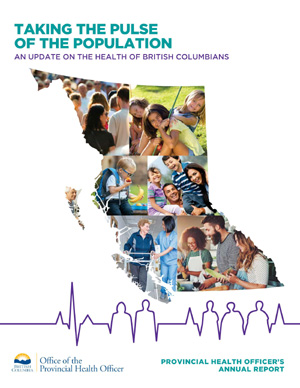Friday, January 25, 2019 ~ BC.
by Mary P Brooke, B.Sc. ~ West Shore Voice News
BC’s provincial health officer, Dr. Bonnie Henry, has today released a report called Taking the Pulse of the Population: An Update on the Health of British Columbians. It examines the progress made toward 36 performance measures of public health identified in the provincial strategy document, BC’s Guiding Framework for Public Health.
The concerns she highlighted to media today were poor success with mental health in BC compared to other provinces across Canada, and also how poverty is seen to have high impact on overall health outcomes. Dr Henry also seemed concerned about the degree to which young women are binge-drinking, as this can affect pregnancy outcomes in addition to general health concerns. A large number of deaths from opioid overdoses are among young men; this will have an impact on family life and social systems going forward.

“However, not all British Columbians are experiencing these improvements, and there remain important differences in health status based on region of the province, between sexes and by age. As well, there are some measures where we are actually losing ground.”
Focus and action are needed in several areas to address worsening trends:
* the disparities in life expectancy between local health areas;
* fruit and vegetable consumption as a marker of healthy eating;
* early childhood development; and
* hazardous drinking behaviours.
Areas of challenge are stated as:
* fruit and vegetable consumption;
* the percentage of students who report they are learning to stay healthy at school;
* early childhood development, and positive mental health; and
* hazardous drinking behaviour.
“More targeted health prevention and promotion programs will help close those gaps and reverse worsening trends,” said Henry. “Other social and economic factors, such as income, housing and early childhood education play an important role in people’s health and well-being. Collaborations across all levels of government, health authorities and other health partners will be key to achieving our goal of a healthier B.C.”

Gender-related disparities were found in several measures. For example, males are twice as likely to die of unintentional injuries or due to preventable causes, whereas females are less likely to be physically active and have higher rates of fall-related hospitalizations among those aged 75 years and older.
The gap in life expectancy between regional health authorities is widening and is now greater than the gap between males and females. Health-adjusted life expectancy – a measure of both quantity and quality of life years – is highest in the Vancouver Coastal Health region (71.7 years for males and 75.1 years for females) and lowest in Northern Health region (66.7 years for males, 69.0 years for females).
Today Dr Henry produced seven recommendations to the Ministry of Health, health authorities and partners to advance public health in British Columbia.
Under Section 66 of the Public Health Act, the provincial health officer has the authority and responsibility to monitor the health of the population in British Columbia, and to provide independent advice on public health issues and the need for legislation, policies and practices respecting those issues.
The recommendations from Dr Henry today are:
- 1. Establish a legislated health in all policies approach in B.C., using a health impact assessment model that includes a requirement for assessing health and equity impacts for all proposed, new or revised policy, legislation or programming across the B.C. government.
- 2. Develop and implement a comprehensive health-promotion strategy that recognizes sex- and gender-specific health needs, and supports all gender identities and sexual orientations through appropriately targeted interventions.
- 3. Increase support for government programs and policies across government that focus on health among women (including pregnant and postpartum women), children, youth and families.
- 4. Increase the focus on illness and injury prevention, as well as health promotion, for people living in rural and remote areas.
- 5. Develop a more robust and meaningful population health and public health surveillance system. This includes reviewing the performance measures in BC’s Guiding Framework for Public Health, identifying new or revised measures, and establishing regular and ongoing public health reporting.
- 6. Establish more relevant and applicable performance measures to monitor environmental health. This includes establishing and/or further developing mechanisms to monitor air, water, soil and food supplies, as well as the health impacts of climate change.
- 7. Commit to increasing the proportion of health authority budgets allocated to population and public health to 6%.
The impacts of increased alcohol consumption and the opioid overdose crisis were two areas of challenge identified in the development of this report. A review of the provincial alcohol policy and the impact of the opioid overdose crisis will be examined in detail in future PHO reports.
“Understanding the health status of British Columbians is critical to effective program planning,” said Dr. Gord Miller, president, Public Health Association of BC. “The Public Health Association of BC welcomes the provincial health officer’s report. This population health report is an essential tool for addressing health inequalities and ensuring that health programs meet the real needs of our citizens.”
Links:
Taking the Pulse of the Population: An Update on the Health of British Columbians
BC’s Guiding Framework for Public Health
New Canada Food Guide shifts to general guidelines
~ West Shore Voice News editor Mary P Brooke holds a B.Sc. in nutrition science with an emphasis on community health education and optimal prenatal nutrition.



